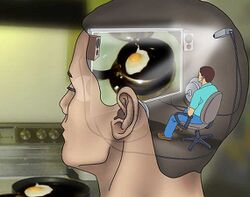Derealization: Difference between revisions
>Oskykins m Text replacement - "===See also== *Responsible use=" to "===See also=== *Responsible use" |
>Josikins overhauled component, improved wordflow, organisation and readability etc |
||
| Line 1: | Line 1: | ||
<onlyinclude> | <onlyinclude> | ||
[[File:Life_through_a_screen_by_Anonymous.jpg|thumbnail|250px|An artistic replication of what it feels like to experience watching the world through a screen.]] | [[File:Life_through_a_screen_by_Anonymous.jpg|thumbnail|250px|An artistic replication of what it feels like to experience watching the world through a screen.]] | ||
'''Derealization''' or '''derealisation''' (sometimes abbreviated as '''DR''') | '''Derealization''' or '''derealisation''' (sometimes abbreviated as '''DR''') can be described as an anomaly of self-awareness that consists of a feeling that the external world seems fundamentally unreal, dreamlike, distant, or lacking in depth and spontaneity. It can occur under the influence of [[hallucinogen|hallucinogenic]] substances, particularly [[dissociative|dissociatives]], and may persist for some time after sobriety. It is often claimed by people who have derealization that reality persistently feels as if it is a dream, or being watched through a screen like a film, or videogame. These feelings can sometimes cause a sensation of alienation and distance between the person and others around them. | ||
Derealization can sometimes be distressing to the user, who may become disoriented by the loss of a sense that their external environment is a genuinely real existence. However, it does not have to be an inherently negative altered state of awareness, as it does not directly affect one's emotions or thought patterns. | |||
This state of mind is commonly associated with and occurs along side of a very similar psychological disorder known as depersonalization. While derealization is a perception of the unreality of the outside world, depersonalization is a subjective experience of unreality in one's sense of self. | |||
In psychology, symptoms of chronic derealization or depersonalization are common within the general population, with a lifetime prevalence of up to 26-74% and 31–66% at the time of a traumatic event.<ref>The epidemiology of depersonalisation and derealisation. A systematic review | https://www.ncbi.nlm.nih.gov/pubmed/15022041</ref> It has been demonstrated that derealization may be caused by a dysfunction within the brains visual processing center (occipital lobe) or the temporal lobe, which is used for processing the meaning of sensory input, language comprehension, and emotion association.<ref>Separating depersonalisation and derealisation: the relevance of the “lesion method” (bmj.com) | http://jnnp.bmj.com/content/72/4/530</ref> | |||
Derealization is a particularly common accompanying effect during states of hallucinogen induced anxiety. It is most commonly induced under the influence of moderate dosages of dissociative compounds such as ketamine, MXE, DCK, and 3-MeO-PCP. However, it may also occur less commonly on other types of hallucinogens and during withdrawals from stimulants or depressants.</onlyinclude> | |||
===Psychoactive substances=== | ===Psychoactive substances=== | ||
Compounds within our [[psychoactive substance index]] which may cause this effect include: | Compounds within our [[psychoactive substance index]] which may cause this effect include: | ||
Revision as of 02:19, 17 December 2017

Derealization or derealisation (sometimes abbreviated as DR) can be described as an anomaly of self-awareness that consists of a feeling that the external world seems fundamentally unreal, dreamlike, distant, or lacking in depth and spontaneity. It can occur under the influence of hallucinogenic substances, particularly dissociatives, and may persist for some time after sobriety. It is often claimed by people who have derealization that reality persistently feels as if it is a dream, or being watched through a screen like a film, or videogame. These feelings can sometimes cause a sensation of alienation and distance between the person and others around them.
Derealization can sometimes be distressing to the user, who may become disoriented by the loss of a sense that their external environment is a genuinely real existence. However, it does not have to be an inherently negative altered state of awareness, as it does not directly affect one's emotions or thought patterns.
This state of mind is commonly associated with and occurs along side of a very similar psychological disorder known as depersonalization. While derealization is a perception of the unreality of the outside world, depersonalization is a subjective experience of unreality in one's sense of self.
In psychology, symptoms of chronic derealization or depersonalization are common within the general population, with a lifetime prevalence of up to 26-74% and 31–66% at the time of a traumatic event.[1] It has been demonstrated that derealization may be caused by a dysfunction within the brains visual processing center (occipital lobe) or the temporal lobe, which is used for processing the meaning of sensory input, language comprehension, and emotion association.[2]
Derealization is a particularly common accompanying effect during states of hallucinogen induced anxiety. It is most commonly induced under the influence of moderate dosages of dissociative compounds such as ketamine, MXE, DCK, and 3-MeO-PCP. However, it may also occur less commonly on other types of hallucinogens and during withdrawals from stimulants or depressants.
Psychoactive substances
Compounds within our psychoactive substance index which may cause this effect include:
- 3-Cl-PCP
- 3-FPM
- 3-HO-PCE
- 3-HO-PCP
- 3-MeO-PCE
- 3-MeO-PCMo
- 3-MeO-PCP
- 4-MeO-PCP
- 6-APB
- Blue Lotus
- Cannabis
- Datura
- Deschloroketamine
- Desoxypipradrol
- Dextromethorphan
- Diphenhydramine
- Diphenidine
- Ephenidine
- Gabapentin
- HXE
- JWH-018
- Ketamine
- MDA
- MDMA
- MXiPr
- Memantine
- Methoxetamine
- Methoxphenidine
- Methylphenidate
- Myristicin
- Nitrous
- O-PCE
- PCE
- PCP
- Pregabalin
- Rolicyclidine
- Selective serotonin reuptake inhibitor
See also
- ↑ The epidemiology of depersonalisation and derealisation. A systematic review | https://www.ncbi.nlm.nih.gov/pubmed/15022041
- ↑ Separating depersonalisation and derealisation: the relevance of the “lesion method” (bmj.com) | http://jnnp.bmj.com/content/72/4/530